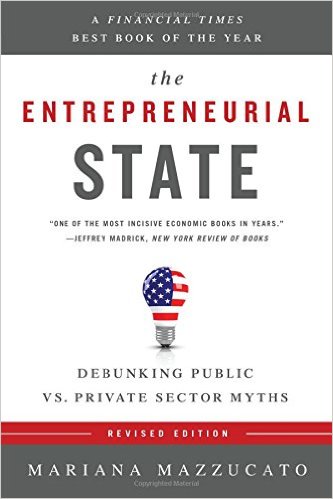
I am afraid people on the free-market side have generally underestimated the impact of Marianna Mazzucato’s book, The Entrepreneurial State. Mazzucato’s work has been reviewed glowingly by Martin Wolf and embraced by many of the left as exposing an untold story: that is, that government, not the private sector, is really behind “innovation“. Little attention has been paid to it in our camp. I understand the reason for that: her book is full of non sequiturs and goofy attempts to make “evidence” out of what are, at best, anecdotes. I understand it looked a rather dismissed thing, but I’m glad José Ricon has a series of splendid posts that really x-rayed it (see here).
An attractive personality and a very good public speaker, Mazzucato is turning into a global academic celebrity, without the laurels of a Nobel Prize or the impressive empirical work of a Piketty. People that would otherwise be very picky about standards of scholarship are surprisingly tolerant with her.
I think this is so because Mazzucato herself understands her role not so much as a researcher – but as somebody who is engaged in a “discursive battle”. She wants to show that innovation is not a byproduct of free exchanges, but rather the result of careful government-engineered design, because she wants to stop what she considers dangerous attempts to stop the growth of government budgets. She thinks that stressing the positive role of the public sector in giving us, say, the iPhone will affect the long-time perception of government by the general public: and she wants to contrast that by doing some PR for government.
If Mazzucato’s thesis that government is always the driving force of innovation in the modern world is clearly flawed, a more modest version of her thesis is defensible. Military technology was often useful for successive civil developments, for example. In countries in which government absorbs some 50% of their GDP, it is hardly surprising that some of this gets spent on innovative endeavours.
On top of that, people do not instinctively associate innovation with market forces. When we think of technology and science, we think of Nasa and university labs. The idea that embedding innovation in commercial product is sort of a trivial, last-mile appeal, I fear, to some well-rooted prejudices.
One almost self-evident argument against entrusting governments with our hopes of innovation is the following: if government is so good at innovating, why does it so seldom “innovate” itself? When it comes to administration and its processes, this is how government looks like, to most of us.
Innovation requires risk taking, and risk taking is discouraged in great bureaucratic apparatuses – and perhaps rightly so. Does this mean that there are no bureaucratic organisations that perform better than others? Certainly not. Two Estonian economists, Rainer Kattel and Erkki Karo, have an interesting article on INET’s website which summarises the findings of a recent paper of theirs.
The longer paper seems to me basically an exercise in taxonomy; I found the shorter article clearer. Kattel and Karo distinguish different kind of bureaucratic organisations and different “innovation policy functions.” En passant, they point to the fact that “In our own country, Estonia, bureaucrats are building a government start-up-like service, called e-residency, which is available to everybody globally and tries to make national borders and nationality-based public services a thing of the past”. Kattel and Karo do not assume that all government programs are created equal. They acknowledge that issues of organization and incentives of bureaucracies are irrelevant.
Their categories may be intriguing, but I fear one shall be careful. It’s one thing to try to understand what works better in government and learn any applicable lessons. Another is deducing from the fact that something works in government, that government works, period, and therefore shall get bigger.
One problem with Mazzucato and others’ discursive battle is that they do not acknowledge a very simple fact: public spending has never been higher, governments never bigger, regulation never so vast and persuasive. All of the above has opportunity costs that frequently go unacknowledged.

READER COMMENTS
R Richard Schweitzer
Mar 13 2016 at 5:35pm
If you think the “Not Invented Here” psychology is debilitating in private endeavors, little imagination is needed to predict its effects through governmental agencies.
There is DARPA.
Yet, there continue to be the impacts of military procurement processes on innovation.
[Just for one example]
We have to keep in mind that facilities (instruments) are developed in social interactions to meet social needs (including economic and military), but inevitably those facilities become institutions, each of which becomes “an instrument that has taken on activities and purposes of is own, separate and different from the purposes for which it was intended” (Carroll Quigley).
The organizations (facilities within governmental operations) are made up of humans whose motivations within the organizational structures become shaped by those structures and relationships; and they respond differently from those shaped in “open” society.
Once one “innovative” concept has been developed, the institutionalized facility will defend its “creation” from change; for the vested interests of those in the organization with stakes in its existence.
Government operations are not alone in these exposures; but, given the extensions of their functions for other objectives, technical, scientific, economic, and social innovations should not be added.
Levi Russell
Mar 14 2016 at 11:55am
Even examples of gov’t innovation such as “the internet” aren’t really as cut-and-dried as leftists prefer to think: http://organizationsandmarkets.com/2015/10/27/the-internet-as-collective-invention/
As much as the left likes to complain that markets don’t incorporate the “true” marginal cost of productive activities, gov’ts have almost no way at all of determining the marginal cost of its activities.
Comments are closed.